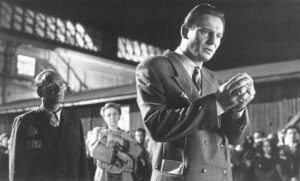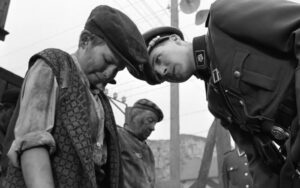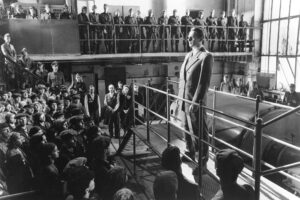“Schindler’s List”: Cinematic Masterpiece
Introduction
In the world of cinema, there are films that entertain, films that inspire, and films that provoke deep contemplation. “Schindler’s List,” directed by the legendary Steven Spielberg, falls into the latter category. Released in 1993, this monumental work of art is more than just a movie; it is a haunting, evocative, and profoundly moving portrayal of the Holocaust and the triumph of the human spirit amidst the darkest of times.
“Schindler’s List” is a film that is both beautiful and brutal, capturing the essence of one of the most horrific periods in human history. Through its impeccable storytelling, stellar performances, unforgettable dialogues, and thought-provoking themes, it continues to stand as a testament to the power of cinema to educate, enlighten, and inspire.

Summary
“Schindler’s List” is based on the true story of Oskar Schindler, a German businessman who saved the lives of more than a thousand Polish-Jewish refugees during the Holocaust. The film opens in the bustling city of Krakow, Poland, in the early 1940s, where the Jewish population is being systematically oppressed and persecuted by the Nazis.
The narrative introduces us to Oskar Schindler (played by Liam Neeson), a charismatic and opportunistic German businessman who arrives in Krakow hoping to profit from the war. Schindler initially sees the Jewish population as a source of cheap labor for his enamelware and ammunitions factories. He forms a partnership with Itzhak Stern (played by Ben Kingsley), a Jewish accountant, to help manage his business.
As Schindler’s factories grow, so does his awareness of the atrocities being committed by the Nazis. He witnesses the liquidation of the Krakow ghetto, where thousands of Jews are herded into trains bound for concentration camps, and he sees the brutal actions of the sadistic Nazi commandant Amon Goeth (played by Ralph Fiennes).
Schindler’s transformation from a profit-driven opportunist to a savior of lives is the heart of the film. He begins to use his wealth and connections to protect his Jewish workers from the horrors of the Holocaust. Schindler’s List, the title of the film, is a real document containing the names of the workers he saved. Each name on that list represents a life he managed to spare from certain death.
The film is a poignant exploration of the power of individual actions in the face of overwhelming evil. Schindler’s efforts to save lives put him at great personal risk, and he spends a significant portion of his fortune to bribe Nazi officials and provide for his workers. The film’s climax comes as Schindler and Stern, standing on a hill overlooking the concentration camp, realize the magnitude of what they’ve accomplished and break down in tears.
The film ends with the surviving Schindlerjuden (Schindler Jews) placing stones on Schindler’s grave in Jerusalem, a symbol of their deep gratitude for his heroic actions.

Characters
“Schindler’s List” features a cast of unforgettable characters, each representing different facets of humanity during the Holocaust. The performances of the actors bring these characters to life with remarkable depth and authenticity.
- Oskar Schindler (Liam Neeson): Oskar Schindler is the film’s central character and the unlikely hero of the story. Neeson’s portrayal of Schindler is both charismatic and complex. He begins as a self-serving businessman but undergoes a profound transformation as he witnesses the horrors of the Holocaust. Neeson’s performance captures Schindler’s moral awakening and his ultimate commitment to saving lives.
- Itzhak Stern (Ben Kingsley): Itzhak Stern is Schindler’s Jewish accountant and conscience. Kingsley’s portrayal of Stern is dignified and quietly powerful. Stern serves as Schindler’s moral compass, urging him to do more to save lives and providing the bureaucratic expertise needed to maintain his factories as a safe haven for Jewish workers.
- Amon Goeth (Ralph Fiennes): Amon Goeth is the chillingly sadistic Nazi commandant of the Plaszow labor camp. Fiennes’ performance is both terrifying and mesmerizing. Goeth is a character devoid of empathy, committing acts of extreme violence and cruelty without remorse. His interactions with Schindler and his Jewish maid, Helen Hirsch, reveal the depths of his malevolence.
- Helen Hirsch (Embeth Davidtz): Helen Hirsch is Amon Goeth’s Jewish maid, and her character serves as a symbol of the vulnerability of Jewish women in the Holocaust. Davidtz’s portrayal of Hirsch conveys a sense of resignation and trauma, highlighting the emotional toll of living under the constant threat of violence.
- Emilie Schindler (Caroline Goodall): Emilie Schindler is Oskar Schindler’s wife. Goodall’s performance showcases Emilie’s unwavering support for her husband’s mission to save lives, even at great personal risk. She represents the compassionate and understanding side of Schindler.
- Julian Scherner (Andrzej Seweryn): Julian Scherner is a Nazi officer who initially clashes with Schindler but later becomes part of his network for saving Jewish lives. Seweryn’s performance highlights the complexity of some Nazi officials who, while complicit in the regime’s actions, also found ways to defy it.
- Helen Stern (Caroline Lagerfelt): Helen Stern is Itzhak Stern’s wife and a fellow worker in Schindler’s factory. Her character illustrates the strength and resilience of Jewish women during the Holocaust.
Dialogues
“Schindler’s List” is filled with powerful and emotionally charged dialogues that capture the essence of the characters and the themes of the film. These dialogues are memorable not just for their words but for the context in which they are spoken. Here are some of the most impactful lines from the movie:
- Oskar Schindler: “I could have got more out. I could have got more. I don’t know. If I’d just… I could have got more.”This line is spoken by Schindler as he reflects on the lives he saved and agonizes over whether he could have done more. It encapsulates his guilt and the weight of his responsibility.
- Itzhak Stern: “The list is an absolute good. The list is life. All around its margins lies the gulf.”Stern’s dialogue emphasizes the significance of Schindler’s List as a lifeline for the Jewish workers. It underscores the idea that every name on the list represents a life saved.
- Amon Goeth: “They cast a spell on you, you know, the Jews. When you work closely with them, like I do, you see this. They have this power. It’s like a virus. Some of my men are infected with this virus. They should be pitied, not punished. They should receive treatment because this is as real as typhus.”Goeth’s dialogue reveals the twisted mindset of a Nazi officer who acknowledges the humanity of the Jews but remains committed to their persecution. It is a chilling reminder of the dehumanization that took place during the Holocaust.
- Oskar Schindler: “Whoever saves one life, saves the world entire.”This line is a powerful affirmation of the value of each individual life. Schindler’s realization that saving even one life is a monumental achievement is a central theme of the film.
- Emilie Schindler: “It’s Hebrew from the Talmud that says, ‘Whoever saves one life, saves the world entire.'”Emilie’s dialogue reinforces the importance of saving lives and reflects the couple’s shared understanding of their mission.
- Oskar Schindler: “I didn’t do enough.”In the film’s closing scenes, Schindler laments that he could have done more. This simple, heartfelt line encapsulates the film’s message that even in the face of great evil, individual actions can make a difference.

Themes
“Schindler’s List” is a film rich with themes that explore the complexities of the human experience during the Holocaust. These themes resonate with viewers on a profound level, prompting reflection on the darkest aspects of humanity and the enduring power of compassion and redemption.
- The Triumph of Humanity over Evil: At its core, “Schindler’s List” is a testament to the triumph of the human spirit over the forces of evil. It shows how one man, Oskar Schindler, made a difference by defying the Nazi regime and saving lives. The film underscores the idea that even in the darkest of times, individuals have the power to do good and preserve the dignity of others.
- The Complexity of Morality: The film delves into the moral complexities faced by individuals during the Holocaust. It raises questions about complicity and collaboration, as well as the ethical dilemmas that arose in a society where standing up for what is right could result in severe consequences. Oskar Schindler’s transformation from a profiteer to a savior exemplifies the struggle to navigate moral choices in an immoral world.
- The Dehumanization of the Jews: “Schindler’s List” vividly portrays the dehumanization of Jewish people during the Holocaust. From the creation of ghettos to the brutal treatment in concentration camps, the film illustrates how a systematic campaign of dehumanization allowed the Nazis to commit unspeakable atrocities. The suffering and resilience of the Jewish characters in the film serve as a powerful reminder of the human capacity to endure and resist in the face of dehumanizing oppression.
- The Power of Compassion: The film highlights the transformative power of compassion and empathy. Oskar Schindler’s journey from indifference to empathy underscores the idea that small acts of kindness and empathy can have a profound impact on the lives of others. It encourages viewers to consider their own capacity for compassion and the difference they can make in the lives of those in need.
- The Weight of Responsibility: Oskar Schindler’s burden of responsibility for the lives he saves is a central theme. The film explores the emotional toll of knowing that more could have been done and the moral weight of the decisions made in the face of life-and-death circumstances. Schindler’s inner conflict reflects the broader moral reckoning that humanity faced during the Holocaust.
- The Importance of Bearing Witness: “Schindler’s List” serves as a powerful instrument of bearing witness to the Holocaust. Through its vivid depiction of historical events and characters, the film ensures that the atrocities of the past are not forgotten. It reminds us of the importance of remembering and acknowledging the horrors of history to prevent such atrocities from happening again

Conclusion
“Schindler’s List” is a cinematic masterpiece that transcends the boundaries of film. It is a work of art that challenges us to confront the darkest chapter in human history while celebrating the resilience of the human spirit. Through its unforgettable characters, poignant dialogues, and profound themes, the film invites us to reflect on our own capacity for compassion, morality, and the power of individual actions.
More than two decades after its release, “Schindler’s List” continues to educate and inspire audiences around the world. It is a testament to the enduring power of cinema to tell important stories, provoke deep emotions, and ignite conversations about the past, present, and future of humanity. As we watch the survivors place stones on Oskar Schindler’s grave in the film’s closing scene, we are reminded that, as Itzhak Stern said, “The list is an absolute good. The list is life.” And so, too, is this extraordinary film.
“Schindler’s List” trailer (youtube)- https://www.youtube.com/watch?v=gG22XNhtnoY